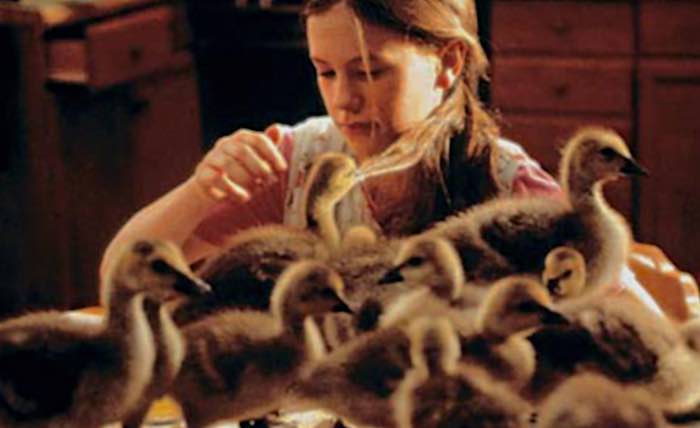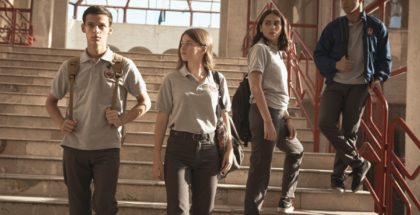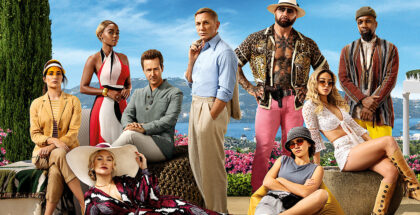The 90s on Netflix: Fly Away Home (1996)
Review Overview
Families
7Flight
8Feels
9Mark Harrison | On 17, Jun 2022
Director: Carroll Ballard
Starring: Jeff Daniels, Anna Paquin, Dana Delany, Terry Kinney, Jeremy Ratchford
Certificate: U
Do you remember the 1990s? Mark does. Every month, he flashes back to the golden decade of our childhood. From family-friendly films to blockbusters we shouldn’t have been watching, get ready for a monthly dose of nostalgia, as we put down our VHS tapes and find out whether the 90s on Netflix are still Live & Kicking.
It would only take a small misstep in either direction for Fly Away Home to be a much zanier film. And yet, as directed by Carroll Ballard, who has past and later form for movies revolving around animal characters, the story of an inventor and his 13-year-old daughter teaching baby geese to fly is much more moving and majestic than you’d expect. If you don’t think it’s going to get you in the feels, you’re dead wrong.
Inspired by Canadian naturalist and inventor Bill Lishman’s autobiography Father Goose, the 1996 film hangs its incredible true story on a fictionalised father-daughter dynamic. Amy Alden (Anna Paquin) has her life turned upside down when her mother dies in a car accident in New Zealand and her estranged dad, Thomas (Jeff Daniels), takes her back to Canada to live with him and his girlfriend, Susan (Dana Delany).
As construction crews encroach on local habitats, she discovers 16 goose eggs in a felled tree and naturally takes them home with her. When the orphaned birds hatch, they imprint on Amy, which leads to problems when Animal Regulation officer Glen Seifert (Jeremy Ratchford) informs her that domesticated geese must be rendered flightless for their own safety. Determined to reintroduce the geese to the wild, Thomas and Amy take an unorthodox approach to teaching them to migrate by using ultralight aircraft.
You can almost hear that one voiceover guy saying “they’re going on a wild goose chase”, can’t you? But there’s refreshingly little in the way of zaniness in Robert Rodat and Vince McKewin’s writing, Ballard’s direction or the cast’s performances. And that’s despite the fact that Daniels’ character is a full-out wacky inventor, most reminiscent of Dick Van Dyke in Chitty Chitty Bang Bang.
He doesn’t play it wacky, though, and we know that Paquin, post-The Piano, is much too good a performer to play it precocious. Even Terry Kinney’s daft uncle character is essentially tame and well-meaning. As a result, a comic beat like a gosling falling into a toilet bowl as it explores the house is all the cuter for being a one-off rather than setting the tone for the whole thing.
Counter to the decade’s other big environmental family fable, Free Willy, it’s not heightened or melodramatic fare. Only with lead actors as good as these can you pull off the rueful and difficult father-daughter dynamic that plays so well here, and the villains aren’t outright evil as much as they’re cynical and self-serving. The result is accessible for kids, but also very mature in its portrayal of teenage Amy behaving irrationally and then learning and growing from her grief. A scene between Paquin and Delany puts this in the ranks of 1990s family movies that you suspect might have been life-saving for those going through similar trauma.
Caleb Deschanel’s cinematography earned the film an Oscar nomination (but lost to The English Patient) and you can see why it was so lauded. This is a flat-out beautiful film from beginning to end.
Things flag a little towards the end of the second act with a comic pitstop at a US Air Force base and the media circus that ensues, but quickly recovers with an awe-inspiring detour to downtown Baltimore. The confidence with which Ballard gradually phases out the exposition and the banter and then ultimately allows the stunning finale to play without dialogue is the sort of real dramatic spectacle you rarely see played straight in the movies these days. It’s goosebumps all around.
The film opened in second place at the US box office behind Jean-Claude Van Damme actioner Maximum Risk, but performed better on home video, making 75 per cent of its eventual gross from video sales rather than cinema admissions. Here in the UK, it topped the box office for two weeks in February 1997, perhaps because its trailer was widely seen on the VHS pre-rolls of Jumanji and Matilda, two other 1990s TriStar-backed bangers we’ve previously covered in this column.
One of the decade’s true unsung gems, Fly Away Home is all the more fantastical for its grounded approach to its true story, never descending into mawkishness. Borne aloft by marvellous performances from Paquin and Daniels and its dazzling cinematography, it’s truly uplifting stuff.
Next Time on The 90s On Netflix…
“What is this, some sort of dork outreach programme?”



















